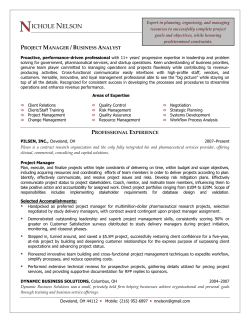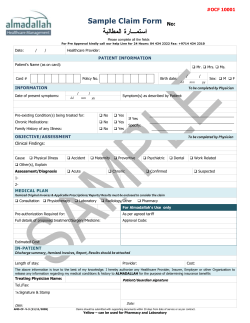
Evolving to a Clinical Practice: New Paradigm, New Thinking
Evolving to a Clinical Practice: New Paradigm, New Thinking Henri R. Manasse Jr., Ph.D., Sc.D. (Hon.), FFIP Professor and Dean Emeritus University of Illinois at Chicago Chair, FIPEd Steering Committee Evolving to a Clinical Practice Outline 1. 2. 3. 4. 5. 6. 7. 8. 9. WHO Consultations on Pharmacy and Pharmacy Education World Health Professions Alliance WHPA Statement on Interprofessional Collaborative Practice Pharmacists as a member of the health care team FIP Ministers Summit: Amsterdam and Stakeholders Roundtables Pan-American Conferences on Pharmaceutical Education Amsterdam Declaration – FIP Centennial Pharmaceutical Care Future Agenda Henri Manasse Jr. Evolving to a Clinical Practice WHO Consultations on Pharmacy The role of the pharmacist in the health care system – New Delhi, India, 1988 and Tokyo, Japan 1993 Recommendations regarding: - The scope of pharmacy and functions of pharmacists: Legislation, drug information, community and hospital pharmacy, industrial pharmacy and academic activities, training other health care workers, role in health care teams. - Pharmacy manpower development for health care systems: Manpower planning, undergraduate education, postgraduate education and research, continuing education Henri Manasse Jr. Evolving to a Clinical Practice WHO Consultations on Pharmacy The role of the pharmacist in the health care system: Preparing the future pharmacist: Curricular Development - Vancouver, Canada, 1997. Outcome: Planning a framework to serve as a guide to schools/faculties of pharmacy for curricular revision, which should include the following aspects: - Effective use of existing resources, the role of the pharmacists as described in “The Sevenstart Pharmacist”, - Curricular changes - Promotion of effective partnerships. Henri Manasse Jr. Evolving to a Clinical Practice WHO Consultations on Pharmacy The role of the pharmacist in self care and self medication: The Hague, The Netherlands, 1998. Recommendations: - Education: “Teachers – practitioners” Training Self and peer audit: Performance Standards Ethical and commercial factors Henri Manasse Jr. Evolving to a Clinical Practice World Health Professions Alliance The Alliance works to improve global health and the quality of health services and facilitates collaboration among the health professions and other major stakeholders. According to WHO: “Collaborative practice happens when multiple health workers from different professional backgrounds work together with patients, families, carers and communities to deliver the highest quality of care across settings”. Henri Manasse Jr. What do you think?? When all is said and done, more is said than done! George Carlin, comedian Evolving to a Clinical Practice WHPA Statement on Interprofessional Collaborative Practice Effective interprofessional collaborative practice can lead to: - Improved access to health interventions and improved coordination between different sectors; - A comprehensive, coordinated and safe health system that is responsive to the needs of the population; - Efficient use of resources; - Reduced incidence and prevalence of disability; - Increased job satisfaction, with reduced stress and burnout of health professionals. Henri Manasse Jr. Evolving to a Clinical Practice Pharmacists as a member of the health care team Responsibility Commitment Confidentiality Patient Orientation Competence Over the past 40 years, the pharmacist’s role has changed from that of compounder and dispenser to one of “drug therapy manager”. This involves responsibilities to ensure that wherever medicines are provided and used, quality products are selected, procured, stored, distributed, dispensed and administered so that they contribute to the health of patients, and not to their harm. Henri Manasse Jr. Evolving to a Clinical Practice Pharmacists as a Member of the health care team To be effective health care team members, pharmacists need skills and attitudes enabling them to assume many different functions. The concept of the “seven-star pharmacist” was introduced by WHO and taken up by FIP in 2000 in its policy statement on Good Pharmacy Education Practice. Leader Caregiver Life-long learner Decision-maker Teacher Communicator Manager Henri Manasse Jr. Evolving to a Clinical Practice Ministers Summit: Amsterdam “The benefits of responsible use of medicines: setting policies for better and cost-effective healthcare” The Ministers’ Summit called for action in four areas: • Coordinating and incentivising better alignment between healthcare professionals to foster continuity of care and better management of medicines. • Ensuring patient needs determine policies to manage key usage issues, such as nonadherence, the single largest cause of suboptimal use of medicines. • Showing commitment to successful initiatives in innovation and learning. • Supporting evidence-driven policymaking by investing in healthcare data to plan and evaluate effective intervention policies. Henri Manasse Jr. Evolving to a Clinical Practice Stakeholders Roundtables The responsible use of medicine will not emerge from any isolated single sector taking the initiative; rather, it will depend fundamentally on aligning and bringing together the interests and capacities that are represented in all of those stakeholder sectors. Henri Manasse Jr. Evolving to a Clinical Practice Stakeholders Roundtables Right medicine to the right patient 1- Utilizing the full capacity of the entire workforce 2- Focus on the high return targets 3- Systems based-approach to achieve proper use of medication Adherence 1- Focuses on the needs of the patient 2- Reimbursement and financial policies: Promote integrated care 3- Richer understanding of patient needs Transformative power of shared information 1- Pharmacists and pharmacies must be brought into the electronic record system Innovation 1- New Medicines 2- Enable environments to promote and support new services provided to patients Henri Manasse Jr. Evolving to a Clinical Practice Pan-American Conferences on Pharmaceutical Education Pharmaceutical education throughout the Americas is responsible for preparing students to begin the practice of pharmacy as vital members of the health care team with all the required skills and knowledge. The Pharmaceutical Conferences on Pharmaceutical Education have been held since 1990 each three years to promote the collaboration among Colleges, Schools and Departments of Pharmacy in the Americas. Henri Manasse Jr. Evolving to a Clinical Practice Pan-American Conferences on Pharmaceutical Education I Pan American Conference on Pharmaceutical Education, Miami, USA 1990 Declaration of Principles: • • • • • Pharmacists should be seen as the medicines experts; Commitment from the pharmacists towards primary care; Integration of pharmacists in the health care team; Increase collaboration among universities, pharmacy; organizations, professional organizations and governments Promote international cooperation between Schools of Pharmacy and student exchange programmes. Henri Manasse Jr. Evolving to a Clinical Practice Pan-American Conferences on Pharmaceutical Education IX Pan American Conference on Pharmaceutical Education: Innovative Methodologies for Education and Evaluation, Maryland, USA Two documents approved: Propuesta de Acreditación para carreras de Farmacia de América Latina Propuesta de Plan Básico de Educación Farmacéutica y Competencias del Farmacéutico para la práctica profesional Henri Manasse Jr. Evolving to a Clinical Practice Amsterdam Declaration – FIP Centennial “Pharmacists and Pharmaceutical scientists accept responsibility and accountability for improving global health and patient health outcomes by closing gaps in the development, distribution, and responsible use of medicines.” “As pharmacists and pharmaceutical scientists, we are experts in the development, distribution, and responsible use of medicines. We are committed to ensuring optimal outcomes from medication therapy through patient-centered care.” Henri Manasse Jr. Evolving to a Clinical Practice Pharmaceutical Care In 1990 Hepler and Strand defined a new way to look at the responsibilities of the pharmacist and pharmacy services, applying the term "pharmaceutical care" to a new concept of pharmacists' services. Hepler CD, Strand L. Opportunities and responsibilities in pharmaceutical care. Am J Hosp Pharm. 1990;47:533-43. “The mission of the pharmacist is to provide pharmaceutical care. Pharmaceutical care is the direct, responsible provision of medication-related care for the purpose of achieving definite outcomes that improve a patient’s quality of life.” American Society of Hospital Pharmacists. ASHP statement on pharmaceutical care. Am J Hosp Pharm. 1993; 50:1720–3. Henri Manasse Jr. Evolving to a Clinical Practice Pharmaceutical Care An updated definition describes pharmaceutical care as "a patient-centered practice in which the practitioner assumes responsibility for a patient's drugrelated needs and is held accountable for this commitment". Cipolle RJ, Strand LM, Morley PC. Pharmaceutical care practice: the clinician’s guide. 2nd ed. New York: McGraw-Hill; 2004 Product Centered Patient Centered Henri Manasse Jr. Evolving to a Clinical Practice What came first? Henri Manasse Jr. Evolving to a Clinical Practice Future Agenda Practice Change Legal Change Educational Change Scope of Practice Training Change Professional Standards First Degree Duties Henri Manasse Jr. Advanced Practice Evolving to a Clinical Practice How to engage with FIP? Henri Manasse Jr. Evolving to a Clinical Practice Thank you for your attention! Questions?? Comments?? Henri Manasse Jr.
© Copyright 2025











